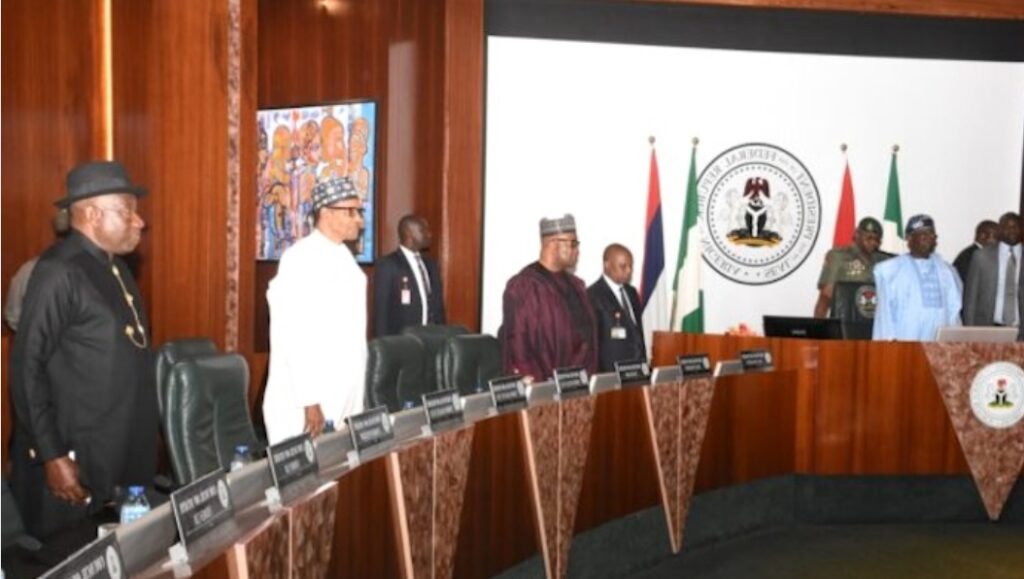Martins Owoseni

Abuja – Past Nigerian leaders including Generals Yakubu Gowon, Abdulsalami Abubakar, Muhammadu Buhari and Dr. Goodluck Jonathan on Tuesday passed a vote of confidence on President Bola Tinubu’s leadership of the nation.
This was one of the highlights of the maiden meeting of the National Council of States (NCS) presided over by President Tinubu at the State House, Abuja, according to local news outlets.
The duo of former Presidents Buhari and Jonathan attended the meeting physically, while Generals Gowon and Abubakar joined virtually.
However, Chief Olusegun Obasanjo and General Babangida were absent.
Briefing reporters after the meeting, Governor of Kwara State and Chairman of the Nigeria Governors’ Forum (NGF), Abdulrahman Abdulrazaq, said the council unanimously passed a vote of confidence on Tinubu for the way he has governed the country so far.
He claimed that the council was satisfied “with the presentations made by ministers on the progress of the economy”.
Also speaking, the Minister of Solid Mineral Development, Dele Alake, said the council also praised Tinubu for resisting a forceful takeover of government.
Alake said the recent #EndBadGovernance action was not a protest but a movement.
He added that the NCS affirmed that nobody will be allowed to change the government except through the ballot box.
The official revealed that seven ministers made presentations to the council on the progress being made on economic diversification and economy.
On his part, the Finance Minister and Coordinating Minister of the Economy, Wale Edun, said the ministers updated the council on the progress of the macroeconomic policies being followed which he said has placed the country of the path of growth and stability.
Last week, Amnesty International accused Nigerian security forces of killing at least 21 protesters during a week of economic hardship protests
Police and other security agencies clamped down on protests after thousands of people joined rallies against government policies and the high cost of living from August 1st to 10th. Protests have since dwindled significantly.
Nigeria is facing its worst economic crisis in decades, with skyrocketing inflation, a national currency in free-fall and millions of people struggling to buy food. Only two years ago Africa’s biggest economy, Nigeria is projected to drop to fourth place this year.
The pain is widespread. Unions strike to protest salaries of around $20 a month. People die in stampedes, desperate for free sacks of rice. Hospitals are overrun with women wracked by spasms from calcium deficiencies.
Although President Bola Tinubu increased the minimum wage — after strike action and months-long negotiations with labour unions — from N30,000 to N70,000, his government has increased spending for officials at a time of nationwide starvation.
For workers earning the new N70,000, or $43, per month minimum wage, capricious inflation and naira value have inflicted too much damage for the changes to make any difference in their lives.
The crisis is largely believed to be rooted in two major changes implemented by Mr Tinubu, elected 14 months ago: the partial removal of fuel subsidies and the floating of the currency, which together have caused major price rises.
A nation of entrepreneurs, Nigeria’s more than 200 million citizens are skilled at managing in tough circumstances, without the services states usually provide. They generate their own electricity and source their own water. They take up arms and defend their communities when the armed forces cannot. They negotiate with armed kidnappers when family members are abducted.
But right now, their resourcefulness is being stretched to the limit.
